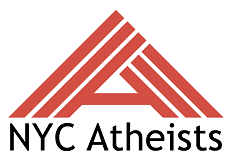
September 2016
September Book & Film Club
Host: Lisa Smith Film: The Darwin Awards We will view the film about the tongue-in-cheek Darwin Awards for stupidity and discuss afterwards. Loosely based on the book series of the same name, The Darwin Awards is a wry indie film that deals with the premise that some people will live long and prosperous lives, while the weaker will weed themselves out by committing unbelievably stupid acts (such as smashing into a high-rise window to prove it’s shatterproof, or using dynamite as…
October 2016
October Book & Film Club
Host: Lisa Smith Film: Religulous We will view Bill Maher’s humorously provacative film and discuss afterwards. The event is held at the National Opera Center America, between 29th and 30th Streets, in the 7th Floor Board Room. The event cost is $10 to help cover the cost of the room rental.
June 2019
June Book Club
Host: David Orenstein, PhD Book: Steven Pinker’s “Enlightenment Now: The Case for Science, Humanism and Progress.” INSTANT NEW YORK TIMES BESTSELLER “My new favorite book of all time.” –Bill Gates If you think the world is coming to an end, think again: people are living longer, healthier, freer, and happier lives, and while our problems are formidable, the solutions lie in the Enlightenment ideal of using reason and science. Is the world really falling apart? Is the ideal of progress…
September 2019
September Film and Book Club
Host: David Orenstein, PhD Film: Creation Creation is a 2009 British biographical drama film about Charles Darwin’s relationship with his wife Emma and his memory of their eldest daughter Annie, as he struggles to write On the Origin of Species. Cost: $10 to help cover cost of room rental
October 2019
October Film and Book Club
Host: David Orenstein, PhD Book: Carl Sagan’s The Demon Haunted World: Science as a Candle in the Dark The Demon-Haunted World: Science as a Candle in the Dark is a 1995 book by astrophysicist Carl Sagan, in which the author aims to explain the scientific method to laypeople, and to encourage people to learn critical and skeptical thinking. He explains methods to help distinguish between ideas that are considered valid science and those that can be considered pseudoscience. Sagan states…
